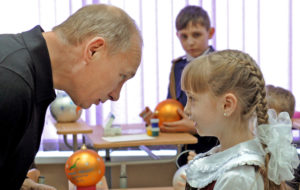Kristina Ozturk is about as far from the model of Soviet motherhood as can be imagined. A 25-year-old former stripper, she and her husband Galip have been farming out their foetuses to surrogates to allow them to have 22 children in the space of 19 months. Their dream of having more than 100 has been derailed since Galip was detained on money-laundering charges. Fortunately, Kristina has not been left to parent single-handed: she and her husband employ 16 nannies.
Even if Galip’s funds do dry up, there’s good news for Kristina: a million rubles might be coming her way shortly. President Vladimir Putin recently announced that he would reinstate the Soviet-era Mother Heroine award, which bestows a lump sum to any Russian mother upon her tenth child’s first birthday. It’s not clear whether Kristina will be eligible for another million rubles when her 20th child reaches the age of one, nor is it certain that hers is the kind of motherhood Putin wants to encourage. After all, she has left Mother Russia and married a Turk: she is not boosting the Russian birth rate.
Is it any wonder pro-natalism does not have a good reputation in the West right now? Urgently necessary though some of us believe it to be, the need for more children is a subject which polite politicians and pundits in most democracies steer clear of, leaving the field to autocrats such as Putin and Hungary’s Viktor Orbán. But unless politicians — whether on the Left or Right — reclaim pro-natalism, they might doom their societies.
This ought to be particularly easy for the Left, which has a rich tradition of pro-natalism. Marx made a nemesis of the Reverend Malthus, who suggested that there was a natural limit to population, and unless humans controlled their fertility, they would live predominantly in penury and misery. This philosophy led many of Malthus’s followers — some of whom became prominent administrators of Empire — to shrug indifferently at both famine in Ireland and India and hunger at home. Marx and Engels launched fearsome attacks; to them, Malthus was a “lackey of the bourgeoisie” and his philosophy “a libel on the human race”. Misery was not the result of the proletariat breeding but of the elite exploiting them. In the socialist nirvana, once the exploitative land-owning class had been removed, there would be population expansion and plenty for all.
True, the communist autocrats of the 20th century went too far in their pursuit of this nirvana. Stalin, too, believed that “the most precious capital, the most decisive capital is human beings”. While this did not prevent him and his regime from snuffing out millions of such beings, they were eager for their creation too, and disseminated posters of large happy families of proletarians. Soviet womanhood was lauded for its procreativity as well as its labour, and the Mother Heroine award — the one revived by Putin — continued in the USSR into the days of Gorbachev. Mao, meanwhile, was consistently pro-natalist, despite efforts from those below him to keep China’s population in check: “It is a very good thing that China has a big population. Even if China’s population multiplies many times, she is fully capable of finding a solution; the solution is production.”
Today, China has pledged to make fertility treatment more available, while also cracking down on abortion, over concerns about birth rates. Meanwhile, in Cuba, the arrival of Castro was accompanied by a baby boom, in part due to restrictions on abortion. These have long been phased out and Cuba has a very low fertility rate. But the regime in Havana still offers lower tax rates to those with children.
In short, it’s understandable that pro-natalist policies have become associated with autocracy. Obviously, today’s progressives are better off disavowing Stalin, Mao and Castro. But disavowing pro-natalist policies in general is short-sighted. When I suggested last month that the British government could restructure the tax system to incentivise families to have children, I was met with howls of horror by the progressive crowd and suggestions that I must be somewhere to the Right of Attila the Hun. But while amending the tax system to encourage childbearing and acknowledge its costs seems out of bounds to the Left, it was a Labour government in 1946 which first introduced such a concept into the benefits system, in the form of family allowance.
Today, childbearing has emphatically ceased to be a Leftist cause. At the more extreme end of the spectrum, the understandably distressing news that Roe vs Wade had been overturned in the US was met with a barrage of anti-natalism. The Guardian, for instance, published testimonies by women who bitterly regretted getting pregnant, including those based in nations where abortion rights are not threatened. “Getting pregnant was the worst thing that could have happened to me,” said one interviewee in Mexico. “I hate my reality, the life I didn’t chose,” said a Spanish mother, while another from Germany said: “If I could start over again, I wouldn’t have had any of my children.” It is not that we should never hear such voices, it is simply that their elevation has somewhat precluded the Left’s potential to make a positive case for the continuation of humanity.
There is solid evidence that people in the UK would like on average to have between two and two and half children — but today are having barely one and a half. This is surely an opportunity for Labour to appeal to an electorate of instinctively pro-natal millennials whose circumstances are frustrating them from having larger families.
What of the Right? For all the policy ground covered in the long Tory leadership race, little has been said on the subject. Liz Truss has suggested tax changes to make it easier for one parent to stay at home, which, worthy or not, is not designed to boost the birth rate. In other words, the Right, too, is failing aspiring parents — and the Left would do well to capitalise on this failure.
For inspiration, Keir Starmer might look to Sweden, a socially liberal nation that touts the second-highest birth rate in Europe. Since the start of the century, the average Swedish woman has around half a child more than the average woman in Greece, a socially conservative nation that has the second-lowest birth rate in Europe. A clue as to why this might be lies in the fact that, when it comes to women’s rights, Sweden and Greece are once again at opposite ends of a European spectrum. Well over 60% of Swedish women participate in the workplace, but only 43% of Greek women do.
In some ways, this is counterintuitive. You might think that where women are staying at home, they are staying at home to take care of children, and that when they are pursuing careers, they are doing so at the expense of having babies. But nothing could be further from the truth. The best way to persuade women who have been given equal rights to bear the next generation is to give them opportunities to partake of those rights in the labour market. This requires finding creative ways — whether through the agency of government or employers or both — of combining work and family. In Sweden, childcare is subsidised and parental leave exceptionally generous.
This is not just a question of Sweden and Greece; they are merely exemplars of a much wider trend. In countries where female participation in the labour force is low, from Portugal to Japan, so too is the fertility rate. This leaves us in a quandary. Where the progressives set the cultural agenda in places like the UK, any advocacy of motherhood is met with anger and scorn. Where conservative values prevail, in places like Greece and Japan, the limitation of a woman’s right to combine family and career depresses the birth rate.
Despite Putin and Orbán, the time has come to proclaim a new, liberal pro-natalism: one that empowers women and men to have the children the evidence proves they want, allows them to combine parenthood with a career, and which acknowledges that, however the family is defined and redefined in the 21st century, a philosophy which places the individual at the centre cannot exists without individuals.
Disclaimer
Some of the posts we share are controversial and we do not necessarily agree with them in the whole extend. Sometimes we agree with the content or part of it but we do not agree with the narration or language. Nevertheless we find them somehow interesting, valuable and/or informative or we share them, because we strongly believe in freedom of speech, free press and journalism. We strongly encourage you to have a critical approach to all the content, do your own research and analysis to build your own opinion.
We would be glad to have your feedback.
Source: UnHerd Read the original article here: https://unherd.com/




